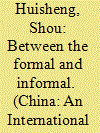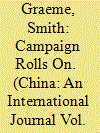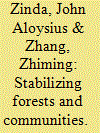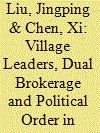|
|
|
Sort Order |
|
|
|
Items / Page
|
|
|
|
|
|
|
| Srl | Item |
| 1 |
ID:
140836


|
|
|
|
|
| Summary/Abstract |
Official efforts to improve rural governance in China have been confronted with resistance not only from local leaders but, interestingly, from rural residents as well. Two problems have jointly prevented these efforts from being effective: agency problems associated with formal institutions that split the interests of village leaders against their community, and collective action problems facing rural residents who are unable to defend their interests through horizontal societal networks. These two problems, working in tandem, allow village leaders to, ironically, enhance their control without being subject to state supervision and popular pressure. Some recent progresses have helped bridge the formal and informal institutions for greater accountability of rural leaders, although persistent challenges suggest an uncertain future for rural governance.
|
|
|
|
|
|
|
|
|
|
|
|
|
|
|
|
| 2 |
ID:
161977


|
|
|
|
|
| Summary/Abstract |
The broad aim of this article is to analyse the institutions of China’s rural local governments in their own right, and thus further our understanding of the political and social mechanisms that maintain and support them. What changes do rural officials’ evolving notions of “development” and “modernisation” under Xi Jinping bring? What shifts can we detect? This article focuses on two developments under Xi: the increased role of the Party-led “leading small groups” in Chinese local governments, and Xi’s “war on poverty”, which aims to lift all Chinese citizens out of poverty by 2020 through a mixture of targeted fiscal support and compulsory resettlement of millions of rural residents. Examining these developments sheds some insights into Xi’s efforts to remodel the Chinese polity and society. Do they represent a real break with past practice, or do they provide evidence of continuity with previous trends in China’s institutions of rural governance?
|
|
|
|
|
|
|
|
|
|
|
|
|
|
|
|
| 3 |
ID:
100500


|
|
|
|
|
| Publication |
2010.
|
| Summary/Abstract |
Over the last decade, rural township governments have been subjected to intensive streamlining and rationalization programmes. This article examines which ongoing reforms and processes are causing township governments to become "hollow shells," and explores the effects of "hollowing out" on township government leaders, staff and rural residents. While the aim of local government reform was to transform extractive township governments into "service-oriented" agencies, this article finds that the current logic of rural governance has produced township governments which are squeezed from above and below. From above, township leaders face the political imperatives of inspections, annual assessments, the need to attract industrial investment and an ongoing process of "soft centralization" by higher levels of government. From below, township staff are drawn out to the villages to enforce family planning policies and maintain social stability. Unprecedented numbers are working as "sent-down cadres" in villages where their capacity to deliver services has been weakened by village amalgamations and the lifting of agricultural taxes and fees. Despite significant boosts to rural health and education investment, rural residents still face a level of government that regards them as problems to be dealt with, rather than citizens to be served.
|
|
|
|
|
|
|
|
|
|
|
|
|
|
|
|
| 4 |
ID:
093849


|
|
|
| 5 |
ID:
161264


|
|
|
|
|
| Summary/Abstract |
China's recent collective forest tenure reform is intended to clarify and certify forest rights, and thereby promote market circulation of forestland, encourage forestry production and safeguard conservation. Central policy statements prioritize parcelling tenure among households to promote efficient management. This study examines how participants experienced the programme in communities in north-west Yunnan. In the study area, rather than individualizing tenure, forestry agencies compelled communities to re-collectivize forests. Nonetheless, residents persist in using household forests despite restrictions. Local officials tacitly sanction these activities. In mountain hinterlands, forest tenure reform has been focused on “stabilizing” forests and communities. Rather than forcibly impose tenure designs, authorities perform what we call accommodative buffering. A set of formal institutions, rules and mappings enables projects like forest ecological compensation payments to go forward. However, state agents at local and higher levels tolerate informal practices that contain the trouble that poorly fitted formal institutions might cause. While potentially more resilient than by-the-book enforcement, these arrangements could leave residents vulnerable to political shifts that require a demonstration of policy adherence.
|
|
|
|
|
|
|
|
|
|
|
|
|
|
|
|
| 6 |
ID:
181135


|
|
|
|
|
| Summary/Abstract |
Drawing on an ethnographic study in two counties in Hunan province, this article explores how political brokerage has contributed to political order in China by facilitating contentious and non-contentious bargaining between the government and ordinary people. To account for the changing role of village leaders in rural politics, the article develops a concept of dual brokerage. This concept not only recognizes formal and informal linkages between village leaders and the two principals – the government and the community of villagers – but also underscores the interactivity between the linkages. We contend that despite the tensions between village leaders’ roles as state agents and as village representatives, these two roles in the reform era tend to be mutually beneficial. Under such an institutional configuration, village leaders in China in the reform era have strong incentives to act as dual agents and can make policy implementation more flexible and the use of state force more moderate. A comparison between the trilateral interactions before and after the tax reform in 2005 confirms that whether village leaders can effectively act as dual agents has a significant impact on the quality of rural governance in China.
|
|
|
|
|
|
|
|
|
|
|
|
|
|
|
|
|
|
|
|
|